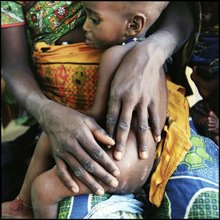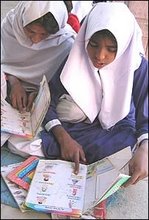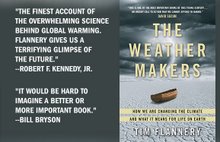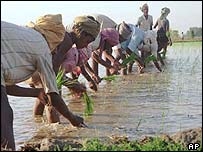PREAMBLE: In 1996, the World Food Summit set a target to halve the number of undernourished people by 2015. However, in 2007, it appears unlikely that this target will be met. One key to success is the Doha round of trade negotiations where 1st world priorities conflict with 3rd world needs. In this issue we focus on the conflict between grain for fuel or for food, the stalled Doha round, and examine global food security.
ETHANOL DEMAND MAY DESTABILIZE THE FOOD SUPPLY
Global competition for corn supplies is generating social instability due to soaring prices out of reach in lower income countries that depend on this staple. The rationale of wealthy countries is to reduce dependence on foreign oil, despite ethanol’s low efficiency and corrosive properties. According to the Earth Policy Institute, an epic competition between the world’s 800 million motorists and its 2 billion poor people is emerging (1): the corn needed to fill a 25 gallon tank with ethanol would feed a poor family for a year. The US ethanol boom is sending shockwaves through the food chain: corn for ethanol is now sought-after by petroleum companies, supported by new government subsidies and mandates: even before the price hikes, ethanol production cost the US taxpayer $11 billion from 1979-2000 (US Government Accounting Office (2)), while the soaring cost of corn in the US recently pushed up the cost of tortillas in Mexico by a third. Facing protests, Mexican President Felipe Calderon responded with price controls on corn-based products (3). The projected savings to US and Canadian automotive fuel supplies from adding ethanol could be achieved several times over, at a fraction of the cost, by raising auto fuel efficiency standards by 20%, levels already exceeded in Europe and Asia.
References: 1) Brown L. Distillery demand for grain to fuel cars vastly understated – world may be facing highest grain prices in history. Earth Policy Institute. Jan 4, 2007-1. http://www.earth-policy.org/Updates/2007/Update63.htm 2) Reguly E. Lining up at the ethanol trough. Globe and Mail B2. Jan 25, 2007. 3) McKenna B. America’s appetite for ethanol poised to take corn from mouths of the poor. Globe and Mail B11. Jan 23, 2007.
WORLD TRADE NEGOTIATIONS – THE DOHA ROUND
This series of negotiations commenced in 2001 in Doha, Qatar. The aim is to lower trade barriers world-wide, among countries of widely varying economic circumstances. Talks have stalled due to a stand-off between the world’s richest countries and developing ones. Although the round addresses all sectors, the impasse pertains to agriculture. Developing countries need “fair trade” to stimulate rural development and efficiency in production and distribution (1). However, protectionism rampant in developed nations, posing in the guise of other agendas eg., intellectual property rights, the “cultural value” of farming, international labour practices, quality control, professed anxiety about disease importation and even bioterrorism. Lack of progress can be laid at the feet of western agribusiness and the farm lobby. Rich country agricultural subsidies total over $300 billion annually, 6 times the value of development assistance. The average EU cow is subsidized at $2.50 per day; more than most Africans live on (2). Food security is an ethical challenge.
The July 2006 talks in Geneva failed to reach agreement on reducing subsidies and lowering import taxes - negotiations will take months to resume. A successful outcome is increasingly unlikely because the trade authority granted under the Trade Act of 2002 to US President Bush expires in 2007. Any pact will then require approval by an increasingly protectionist US Congress, which in turn discourages the willingness of other countries to participate. As WTO Director-General Pascal Lamy stated in a recent prospective, “If the global trading system is to be relevant, it is the responsibility of all members, in particular the big elephants, to meet this challenge”(3).
References: 1) UNDP. Human Development Report. Millennium Development Goals: a compact among nations to end human poverty. New York: Oxford UP 2003. 2) Williams J. 50 facts that should change the world. Icon Books 2004. 3) Lamy P. Doha’s Final Deadline. The World in 2007. 21st ed. The Economist.
GLOBAL FOOD SECURITY – AN OVERVIEW
Nutrition throughout life determines growth, development and disease susceptibility. Although enough food is produced to feed everyone, maldistribution results in hunger and malnutrition, affecting millions. Most vulnerable are the poor, the marginalized, women, and children. Children are most vulnerable, suffering irreversible growth retardation by stunting and wasting, and impaired cognitive development that impacts throughout life; females are twice as likely as males to experience malnutrition.
Food security would exist if all people, at all times, had physical and economic access to sufficient, safe and nutritious food to meet their dietary needs and preferences. Food insecurity results from unavailability, unstable supplies, insufficient purchasing power, inappropriate distribution, or inadequate household utilization. The UN’s Food and Agricultural Organization estimates that 852 million people were undernourished in 2000-2, >95% in developing countries.(1) Barriers to food security can be overcome by economically viable and environmentally sustainable means; however, trade practices and policies associated with deregulated markets mitigate against this goal.
Though food and nutrition insecurity is generally declining worldwide, progress in South Asia is sluggish, while the problem is worsening in Africa due to conflicts, droughts, floods, and economic downturns. The number of undernourished African, estimated at 204 million (1999–2001), is double that of two decades earlier. Food shortages are so severe in East and Central Africa that they require regular international intervention.
Reference: Food and Agricultural Organization. The State of Food Security in the World 2004. Rome: Food and Agricultural Organization of the United Nations; 2004.
Book Review: BANKER TO THE POOR - micro-lending and the battle against world poverty. Muhammad Yunus. Founder of Grameen Bank. Public Affairs New York 2003.
We selected this book because of Muhammad Yunus’s recent award of the 2006 Nobel Prize for Peace. Scanning the web, we selected the closing paragraph of a review by Tom McInerny: “What this book cannot show is his quiet, captivating demeanor, which verges on the spiritual To learn the secret of his man’s goodness, one looks for a sign, a indication of how and why he was called. That secret is his ability to ask ‘Why not?’… where others have willingly supported the status quo, embraced stagnation and elevated what is to the level of what must be.” http://www.grameen-info.org/book/hungary.htm
THANKS FOR VISITING PacificSci GLOBAL PERSPECTIVES!
FROM a Great Canadian and World Statesman
"A great gulf... has... opened between man's material advance and his social and moral progress, a gulf in which he may one day be lost if it is not closed or narrowed..."
Lester B Pearson
http://nobelprize.org/nobel_prizes/peace/laureates/1957/pearson-lecture.html
Thursday 1 February 2007
Subscribe to:
Posts (Atom)
INSPIRATIONAL WELCOME ............................... from T.S.Eliot's "Little Gidding"
If you came this way From the place you would come from... It would be the same at the end of the journey...
If you came, not knowing what you came for, It would be the same... And what you thought you came for Is only a shell, a husk of meaning... From which the purpose breaks only when it is fulfilled If at all.




















